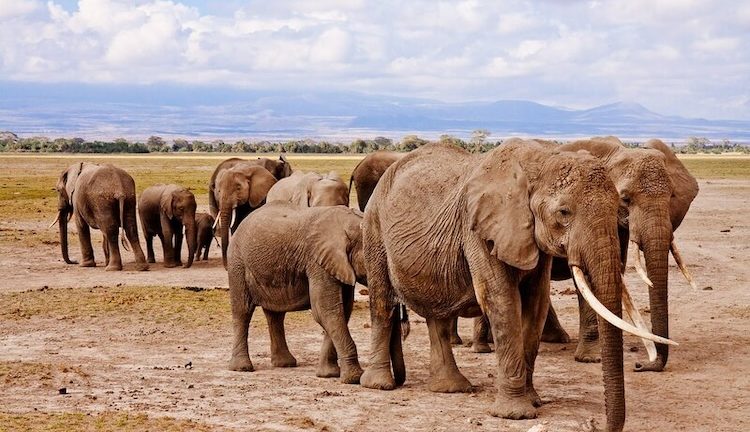By Ngala Killian Chimtom
YAOUNDE, Cameroon | 15 June 2024 (IDN) — A new study has revealed an interesting fact about elephants. Like human beings, they call each other by name.
Researchers analyzed 469 calls, or “rumbles,” from wild African elephants in Kenya that had a known caller and receiver. Using artificial intelligence, they found a “name-like” component that individual elephants recognized and later responded to when the call was replayed, according to the paper, published in the peer-reviewed Nature Ecology and Evolution Journal.
In an exclusive interview with IDN, lead researcher Michael A. Pardo, Ph.D., a Postdoctoral associate at the K. Lisa Yang Center for Conservation Bioacoustics, Cornell Lab of Ornithology, said that elephants “can tell just by hearing a call if it was intended for them or not, which further supports the conclusion that these calls function like a name”-
The following are excerpts from that interview:
How did you go about getting this result?

Michael Pardo: We spent about 14 months in Kenya recording the calls made by elephants, and noting whenever possible who made each call and who each call was addressed to. We combined these recordings with recordings that were made years earlier by our colleagues in a different part of Kenya. We were able to identify the individual elephants by the pattern of nicks and tears in their ears. We then analyzed the recordings using a machine learning model and found that the model could determine who a call was addressed to just from the sound pattern of the call, which suggested that the calls contained information identifying the intended recipient (i.e., a name).
To confirm this, we played the calls back to the elephants themselves and found that they responded more strongly (approaching the speaker more readily and vocalizing more) in response to a call that was originally addressed to them compared to a call that was originally addressed to someone else. So that means that they can tell just by hearing a call if it was intended for them or not, which further supports the conclusion that these calls function like a name.
What does the finding tell you about the cognitive ability of elephants?
These findings underscore the importance of complex emotional bonds between elephants. Elephants have social bonds with a large number of individuals, and they have different relationships with different members of their network. This is most likely why they need names in the first place- to be able to differentiate between all of their bonded social partners and direct communication to specific individuals. The fact that elephants use names to address one another also means that they are capable of understanding the abstract connection between an arbitrary sound and the individual that it refers to, which indicates very sophisticated cognitive ability.
Very often, the thinking has been that the nearest animals to man in terms of their DNA and probably communication skills are chimps. Does this study change that perception-to indicate that somehow, elephants have a level of reasoning akin to that of human beings?
Chimpanzees are much more closely related to humans evolutionarily and genetically. However, despite the fact that humans and elephants are separated by 90-100 million years of evolution, we have independently evolved similar behaviors in some respects, including some behaviors (like names) that do not appear to be shared by our closest primate relatives. This doesn’t necessarily mean that elephants’ reasoning ability is as sophisticated as that of humans, but I’m also not sure how meaningful it is to say that one species is “smarter” than another.
Often, if you compare the cognitive abilities of two species, you will find that one species outperforms the other on one task, and vice versa on a different task. For example, newborn chickens can perform arithmetic (addition and subtraction) better than one year old human children, and sheep are very good at recognizing the faces of both other sheep and humans, whereas humans are not particularly good at recognizing the faces of sheep.
Similarly, tiny fish called cleaner wrasse can recognize themselves in a mirror, which is thought to be a sign of self-awareness, while human children under two years of age often fail this task. But of course, humans outperform these species in other cognitive tasks. The same is likely true for humans and elephants. As humans we tend to place more value on the cognitive tasks that we are best at, and dismiss other cognitive abilities as somehow less important, but I think that viewpoint is a little arrogant and doesn’t really make a lot of sense.
How does this capacity of elephants to communicate enhance their social life?
Elephants have many distinct social relationships with other individuals, and they also have a fission-fusion social structure, meaning that they are not always together with all of their bonded social partners. So it may be particularly beneficial for them to have names so they have a way of addressing communication to specific individuals who are out of sight.

Finally, how significant do you think this finding is?
I think it’s very exciting, and definitely the most significant discovery of my career so far. There are only a handful of examples of animals addressing one another by name, and our study suggests that unlike other animals with names, elephants probably do not rely on imitating the receiver’s calls in order to address her. As I mentioned above this study has implications for our understanding of elephant intelligence and our hope is that this will inspire people to care more about these fascinating animals and improve prospects for the survival of wild elephants.
The study also has implications for our understanding of how language may have evolved in our own species. For example, before human language could evolve, our ancestors needed to first develop the ability to learn new vocalizations, which is something that our primate relatives mostly cannot do. Elephants, dolphins, and parrots all have a remarkable ability to learn new sounds, and they all use this ability to address one another with something like a name. So, this raises the possibility that human ancestors may have first developed an ability to learn new calls in order to address each other by name, and then once they had this ability that allowed fully fledged language to evolve. [IDN-InDepthNews]
Photo source: Earth.ORG


